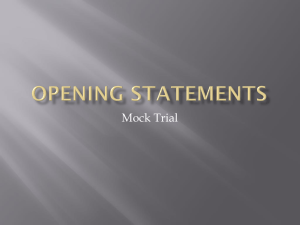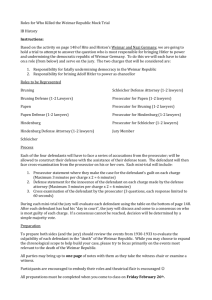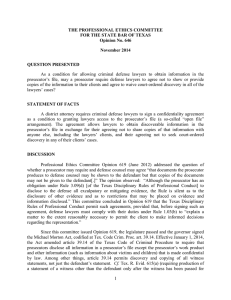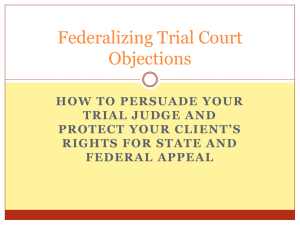THE PROFESSIONAL ETHICS COMMITTEE FOR THE STATE BAR OF TEXAS
advertisement
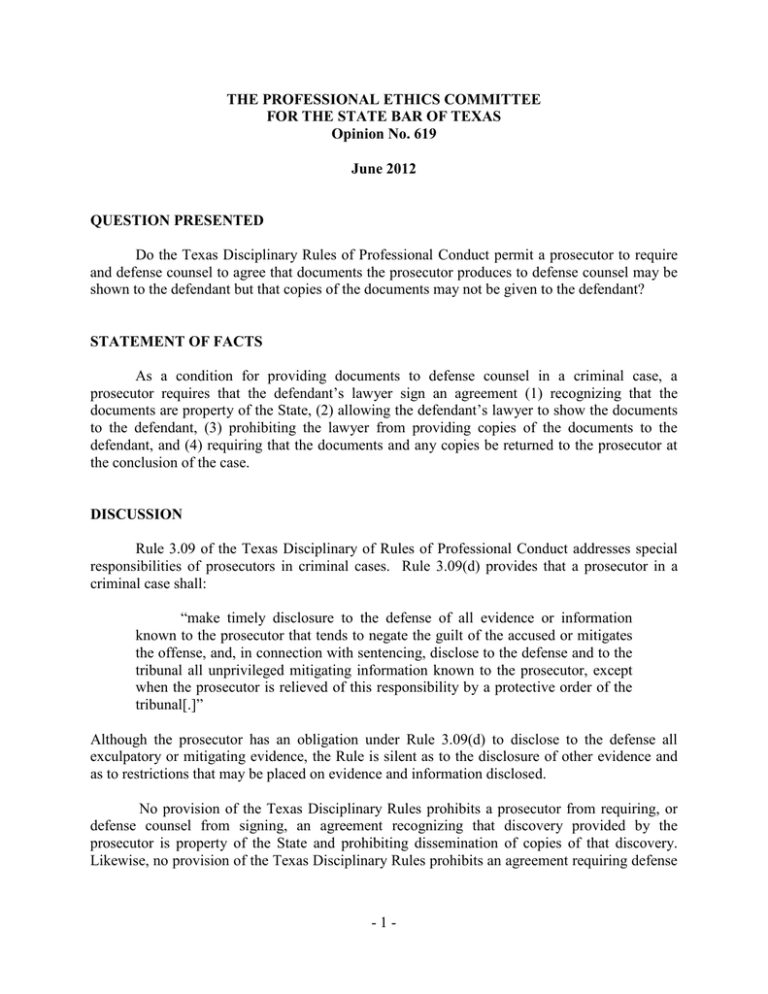
THE PROFESSIONAL ETHICS COMMITTEE FOR THE STATE BAR OF TEXAS Opinion No. 619 June 2012 QUESTION PRESENTED Do the Texas Disciplinary Rules of Professional Conduct permit a prosecutor to require and defense counsel to agree that documents the prosecutor produces to defense counsel may be shown to the defendant but that copies of the documents may not be given to the defendant? STATEMENT OF FACTS As a condition for providing documents to defense counsel in a criminal case, a prosecutor requires that the defendant’s lawyer sign an agreement (1) recognizing that the documents are property of the State, (2) allowing the defendant’s lawyer to show the documents to the defendant, (3) prohibiting the lawyer from providing copies of the documents to the defendant, and (4) requiring that the documents and any copies be returned to the prosecutor at the conclusion of the case. DISCUSSION Rule 3.09 of the Texas Disciplinary of Rules of Professional Conduct addresses special responsibilities of prosecutors in criminal cases. Rule 3.09(d) provides that a prosecutor in a criminal case shall: “make timely disclosure to the defense of all evidence or information known to the prosecutor that tends to negate the guilt of the accused or mitigates the offense, and, in connection with sentencing, disclose to the defense and to the tribunal all unprivileged mitigating information known to the prosecutor, except when the prosecutor is relieved of this responsibility by a protective order of the tribunal[.]” Although the prosecutor has an obligation under Rule 3.09(d) to disclose to the defense all exculpatory or mitigating evidence, the Rule is silent as to the disclosure of other evidence and as to restrictions that may be placed on evidence and information disclosed. No provision of the Texas Disciplinary Rules prohibits a prosecutor from requiring, or defense counsel from signing, an agreement recognizing that discovery provided by the prosecutor is property of the State and prohibiting dissemination of copies of that discovery. Likewise, no provision of the Texas Disciplinary Rules prohibits an agreement requiring defense -1- counsel receiving documents from a prosecutor to return the documents and any copies to the prosecutor. In civil cases, Texas courts may issue protective orders to safeguard confidential information by limiting the dissemination, copying, and use of such information. See Rule 192.6(b) of the Texas Rules of Civil Procedure (authorizing orders in the interest of justice to protect against undue burden, unnecessary expense, harassment, annoyance, or invasion of rights in connection with discovery requests). See also In re Ford Motor Co., 211 S.W.3d 295 (Tex. 2006); General Tire, Inc. v. Kepple, 970 S.W.2d 520 (Tex. 1998). Such protective orders may restrict the recipient of materials produced in discovery from giving or otherwise divulging the protected information to any other person or entity and from copying documents produced and may require the recipient at the conclusion of the litigation to return the documents produced. Before signing a proposed agreement limiting the provision to the defendant of documents produced by the prosecutor, defense counsel has a duty to inform his client of the proposed agreement and available alternatives, if any, to obtaining the documents under the terms of the proposed agreement. See Comment 1 to Rule 1.03 (“The client should have sufficient information to participate intelligently in decisions concerning the objectives of the representation and the means by which they are to be pursued to the extent the client is willing and able to do so.”). In discussing the prosecutor’s proposed agreement and in communications with the defendant generally, the defendant’s lawyer is required by Rule 1.03(b) to “explain a matter to the extent reasonably necessary to permit the client to make informed decisions regarding the representation.” CONCLUSION The Texas Disciplinary Rules of Professional Conduct permit a prosecutor to require and defense counsel to agree that documents the prosecutor produces to defense counsel may be shown to the defendant but that copies of the documents may not be given to the defendant. -2-
